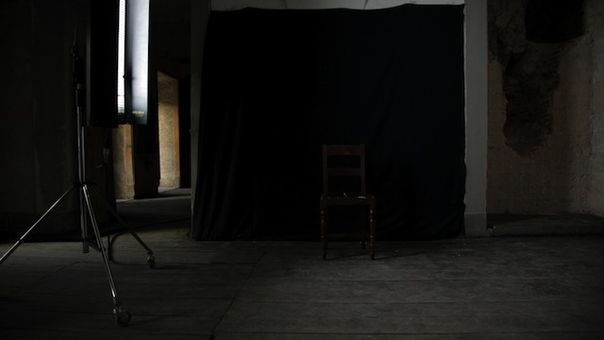THE UNRELIABLE NARRATOR
Talking-head documentary NO MAN’S LAND (Berlinale Forum) challenges traditional ways of turning outstanding life stories into history.

NO MAN'S LAND
Portuguese filmmaker Salomé Lamas shapes her documentary, NO MAN’S LAND (TERRA DE NINGUÉM, Portugal), into a radically sparse form of biography: one person sits in a chair in front of a dark background, telling the story of his life. As Paulo de Figueiredo recounts his experiences as a soldier in the Portuguese Colonial War and then as a CIA-hired mercenary, it’s hard to discern fact from fiction, unless we choose to take Figueiredo at his word. His personality, however, is never a mystery: from the beginning of the film he smilingly confesses to the atrocities he’s committed. He’s both entrancingly frank and sadistic.
The ex-soldier’s speech, recorded over five days, is punctuated with numbered inserts (perhaps to indicate the questions that were omitted from the film; after all, the purpose of all the questions is the same – to encourage Figueiredo to talk) and occasionally with a title card indicating the day and the location of the fight he is about to chronicle (or maybe fantasize about, who knows?). Given the minimalistic approach, any event interrupting the confession -- like, for instance, his sudden decision to get up from the chair and go out to smoke a cigarette – comes as a visual shock.
References to historical events and figures are dense and should be abundantly revelatory to viewers initiated in Portuguese history. For the rest, the documentary doesn’t provide a context, but it doesn’t need to – viewers who need more background information should look to more mainstream documentaries to fill the gaps. NO MAN’S LAND is best seen as a character study for the tough-minded. Several voice-over interventions by the filmmaker (mentioning, for instance, the absence of some documents which could corroborate Figueiredo‘s statements) try to fit the story into a larger context, but the connections remain vague.
There’s artistic merit in Lamas’ decision to talk about atrocious historical events without trying to draw a clear-cut, and perhaps uplifting, conclusion. One could say the film makes demands on the viewers, but it also shows respect for their intelligence and perceptiveness. Brave predecessors have used Lamas’ working methods to similar ends. Claude Lanzmann, whose films are honoured in this year's Berlinale Hommage, made SHOAH, a comprehensive 566-minute documentary about the Holocaust, by editing together interviews with people who were involved. Lanzmann dismisses the way mainstream historical films attempt to make sense out of history by shrinking it down to size. Any life story is just a tiny, loosely connected part of an event. The approach Lamas takes in NO MAN’S LAND – getting inside the head of one unrepentant individual whose guilt is hard to assess – may be a more honest way of taking the measure of historical events.

